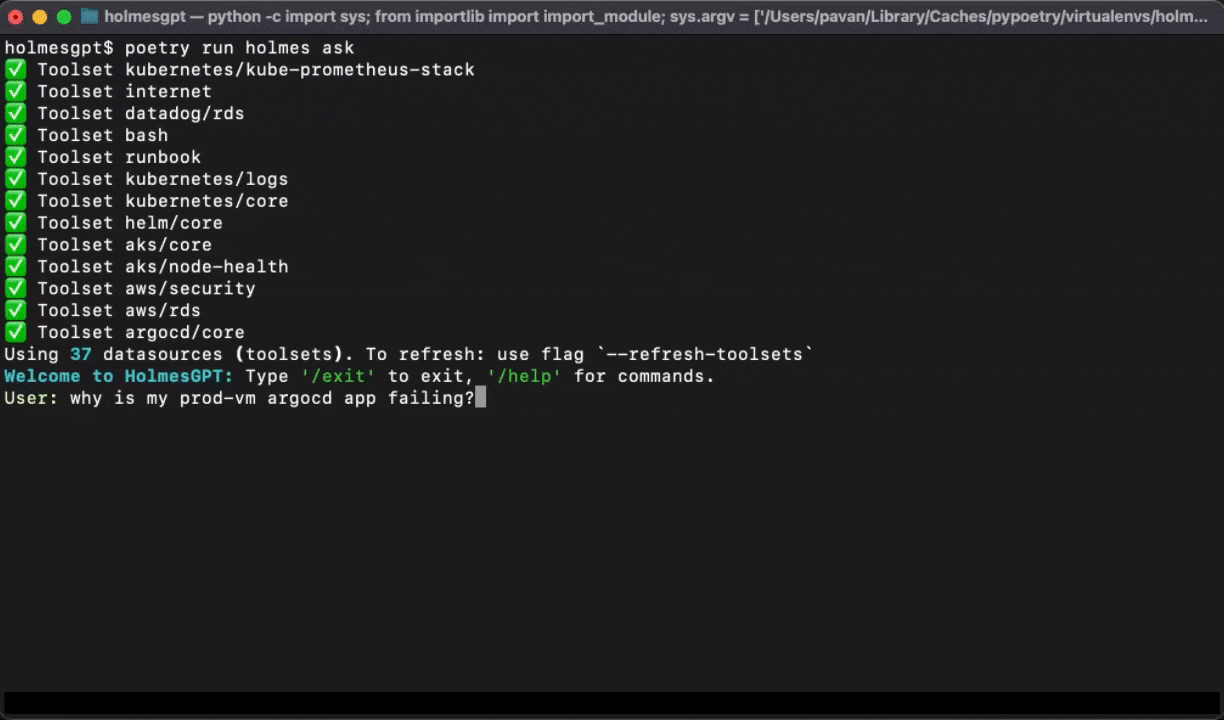ArgoCD¶
By enabling this toolset, HolmesGPT will be able to fetch the status, deployment history, and configuration of ArgoCD applications.
Prerequisites¶
Generating an ArgoCD token¶
This toolset requires an ARGOCD_AUTH_TOKEN environment variable. Generate an auth token by following these steps.
Adding a Read-only Policy to ArgoCD¶
HolmesGPT requires specific permissions to access ArgoCD data. Add the permissions below to your ArgoCD RBAC configuration.
Edit the RBAC ConfigMap: kubectl edit configmap argocd-rbac-cm -n argocd
# Add this to the data section of your argocd-rbac-cm configmap.
# Creates a 'holmesgpt' user with read-only permissions for troubleshooting.
data:
policy.default: role:readonly
policy.csv: |
p, role:admin, *, *, *, allow
p, role:admin, accounts, apiKey, *, allow
p, holmesgpt, accounts, apiKey, holmesgpt, allow
p, holmesgpt, projects, get, *, allow
p, holmesgpt, applications, get, *, allow
p, holmesgpt, repositories, get, *, allow
p, holmesgpt, clusters, get, *, allow
p, holmesgpt, applications, manifests, */*, allow
p, holmesgpt, applications, resources, */*, allow
g, admin, role:admin
Configuration¶
In addition to setting permissions and generating an auth token, you will need to tell HolmesGPT how to connect to the server. This can be done two ways:
- Using port forwarding. This is the recommended approach if your ArgoCD is inside your Kubernetes cluster.
- Setting the env var
ARGOCD_SERVER. This is the recommended approach if your ArgoCD is reachable through a public DNS.
1. Port Forwarding¶
This is the recommended approach if your ArgoCD is inside your Kubernetes cluster.
HolmesGPT needs permission to establish a port-forward to ArgoCD. The configuration below includes that authorization.
Set the following environment variables:
export ARGOCD_AUTH_TOKEN="<your-argocd-token>"
export ARGOCD_OPTS="--port-forward --port-forward-namespace <your_argocd_namespace> --server <your_server_address> --grpc-web"
Then add the following to ~/.holmes/config.yaml:
After making changes to your configuration, run:
holmes:
customClusterRoleRules:
- apiGroups: [""]
resources: ["pods/portforward"]
verbs: ["create"]
additionalEnvVars:
- name: ARGOCD_AUTH_TOKEN
value: "<your-argocd-token>"
- name: ARGOCD_OPTS
value: "--port-forward --port-forward-namespace <your_argocd_namespace> --server <your_server_address> --grpc-web"
toolsets:
argocd/core:
enabled: true
Update your Helm values and run a Helm upgrade:
Note
For in-cluster address, use the cluster DNS. For example: --port-forward --port-forward-namespace argocd --server argocd-server.argocd.svc.cluster.local --insecure --grpc-web
- Add
--insecureto work with self-signed certificates - Change the namespace
--port-forward-namespace <your_argocd_namespace>to the namespace in which your ArgoCD service is deployed - The option
--grpc-webinARGOCD_OPTSprevents some connection errors from leaking into the tool responses and provides a cleaner output for HolmesGPT
2. Server URL¶
This is the recommended approach if your ArgoCD is reachable through a public DNS.
Set the following environment variables:
Then add the following to ~/.holmes/config.yaml:
After making changes to your configuration, run:
To test, run:
Note
In production, always use a Kubernetes secret instead of hardcoding the token value in your Helm values.
Capabilities¶
The table below describes the specific capabilities provided by this toolset. HolmesGPT can decide to invoke any of these capabilities when answering questions or investigating issues.
| Tool Name | Description |
|---|---|
| argocd_app_list | List the applications in ArgoCD |
| argocd_app_get | Retrieve information about an existing application, such as its status and configuration |
| argocd_app_manifests | Retrieve manifests for an application |
| argocd_app_resources | List resources of an application |
| argocd_app_diff | Display the differences between the current state of an application and the desired state specified in its Git repository |
| argocd_app_history | List the deployment history of an application in ArgoCD |
| argocd_repo_list | List all the Git repositories that ArgoCD is currently managing |
| argocd_proj_list | List all available projects |
| argocd_proj_get | Retrieve information about an existing project, such as its applications and policies |
| argocd_cluster_list | List all known clusters |
